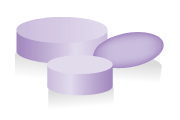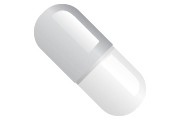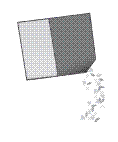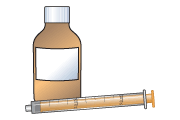Mebeverine hydrochloride for intestinal spasm
This leaflet is for parents and carers about how to use this medicine in children. Our information may differ from that provided by the manufacturers, because their information usually relates to adults. Read this leaflet carefully. Keep it somewhere safe so that you can read it again.
Name of medicine
Mebeverine (mebeverine hydrochloride)
Brand names: Colofac, Aurobeverine, Fybogel Mebeverine (mebeverine + ispaghula husk)
Why is it important for my child to take Mebeverine?
Food from the stomach passes into the intestine, a long muscular tube that contracts, squeezing and pushing the food along so that it can be digested. If your child’s intestine goes into spasm, it squeezes too tightly and causes pain.
Mebeverine will relax the spasm and so reduce the pain. It is sometimes called an antispasmodic.
What is Mebeverine available as?
- Tablets: 135 mg; these contain lactose and sucrose
- Modified-release capsules: 200 mg
- Fybogel Mebeverine granules: 135 mg mebeverine in each sachet with 3.5 g ispaghula husk; these contain aspartame
- Liquid medicine (suspension): 50 mg in 5 mL
When should I give Mebeverine
- Mebeverine is usually given two or three times a day. Ideally this should be about 20 minute before a meal. Your doctor will tell you how often to give it.
Give the medicine at about the same time(s) each day so that this becomes part of your child’s daily routine, which will help you to remember.
How much should I give?
Your doctor will work out the amount of Mebeverine (the dose) that is right for your child. The dose will be shown on the medicine label.
It is important that you follow your doctor’s instructions about how much to give.
How should I give Mebeverine?

Tablets
- Tablets should be swallowed with a glass of water, squash or juice. Your child should not chew the tablet.

Capsules
- Capsules should be swallowed with a glass of water, squash or juice. Your child should not chew the capsule.

Granules
- Sprinkle or stir the granules into a glass of water or diluted squash. Your child should drink it all straight away. Then add some more water or squash to the glass, swirl it around and ask your child to drink it. This makes sure they get all the medicine. Do not give your child these granules just before bedtime.

Liquid medicine
- Shake the medicine well.
- Measure out the right amount using an oral syringe or a medicine spoon. You can get these from your pharmacist. Do not use a kitchen teaspoon as it will not give the right amount.
When should the medicine start working?
The medicine should start to work within 2 hours and your child will have fewer cramps and less pain.
What if my child is sick (vomits)?
- If your child is sick less than 30 minutes after having a dose of Mebeverine, give them the same dose again.
- If your child is sick more than 30 minutes after having a dose of Mebeverine, do not give them another dose. Wait until the next normal dose.
If your child is sick again, seek advice from your family doctor, nurse, pharmacist, or hospital. They will decide what to do based on your child’s condition and the specific medicine involved.
What if I forget to give it?
If you usually give it twice a day: If you remember up to 4 hours after you should have given a dose, give your child the missed dose. For example, if you usually give a dose at about 7am, you can give the missed dose at any time up to 11am. If you remember after that time, do not give the missed dose. Give the next dose as usual.
If you usually give it three times a day: Do not give the missed dose. Just give the next dose as usual.
What if I give too much?
You are unlikely to cause harm if you give an extra dose of Mebeverine by mistake. If you are concerned that you may have given too much, contact your doctor or local NHS services (details at end of leaflet). Have the medicine or packaging with you if you telephone for advice.
Are there any possible side effects?
We use medicines to make our children better, but sometimes they have other effects that we don’t want (side-effects).
Mebeverine rarely causes side effects when given at the correct dosage.
Side effects you must do something about
If your child is short of breath or is wheezing, or their face, lips or tongue start to swell, or they develop a rash, they may be allergic to Mebeverine. Take your child to hospital or phone for an ambulance straight away.
Other side-effects you need to know about
- Fybogel Mebeverine contains isphagula husk, which is a laxative. Your child may feel bloated or pass wind for a few days when they first start taking the medicine, but this should settle down. If it is still a problem after a week, contact your doctor.
If your child’s stomach pain get worse after starting this medicine, contact your doctor.
There may sometimes be other side effects that are not listed above. If you notice anything unusual and are concerned, contact your doctor. You can report any suspected side effects to a UK safety scheme at mhra.gov.uk/yellowcard
Can other medicines be given at the same time as Mebeverine?
If your child takes mebeverine granules (Fybogel Mebeverine), give these at a different time from other medicines. Leave a gap of at least 1 hour between giving mebeverine granules and other medicines.
Is there anything else I need to know about this medicine?
- Intestinal spasms are often strongest soon after eating, so it is usually best to give mebeverine about 20 minutes before a meal.
- Do not give your child mebeverine granules (Fybogel Mebeverine) just before bedtime.
General advice about medicines
- Try to give medicines at about the same times each day, to help you remember.
- Only give this medicine to your child. Never give it to anyone else, even if their condition appears to be the same, as this could do harm.
- Make sure that you always have enough medicine. Order a new prescription at least 2 weeks before you will run out.
- Make sure that the medicines you have at home have not reached the ‘use by’ date on the packaging. Give old medicines to your pharmacist to dispose of.
- If you are not sure a medicine is working, contact your doctor but continue to give the medicine as usual in the meantime. Do not give extra doses, as you may do harm.
If you think someone else may have taken the medicine by accident, contact your doctor straight away.
Where should I keep this medicine?
- Make sure that children cannot see or reach the medicine.
- Keep the medicine in the container it came in.
- Keep the medicines in a cupboard, away from heat and direct sunlight. It should not be stored above 30°C.
Who to contact for more information?
Your doctor, pharmacist or nurse will be able to give you more information about Mebeverine and about other medicines used to treat intestinal spasms.
England: NHS 111
Tel 111
www.nhs.ukScotland: NHS 24
Tel 111
www.nhs24.scotNorthern Ireland: NI Direct
Wales: NHS 111 Wales
Tel 111
www.111.wales.nhs.ukCopyright disclaimer
Version [2]. © NPPG, RCPCH and WellChild, all rights reserved. Review by August 2022.
The primary source for the information in this leaflet is the British National Formulary for Children. For details on any other sources used for this leaflet, please contact us through our website, www.medicinesforchildren.org.uk.
We take great care to make sure that the information in this leaflet is correct and up-to-date. However, medicines can be used in different ways for different patients. It is important that you ask the advice of your doctor or pharmacist if you are not sure about something. This leaflet is about the use of these medicines in the UK, and may not apply to other countries. The Royal College of Paediatrics and Child Health (RCPCH), the Neonatal and Paediatric Pharmacists Group (NPPG), WellChild and the contributors and editors cannot be held responsible for the accuracy of information, omissions of information, or any actions that may be taken as a consequence of reading this leaflet.
